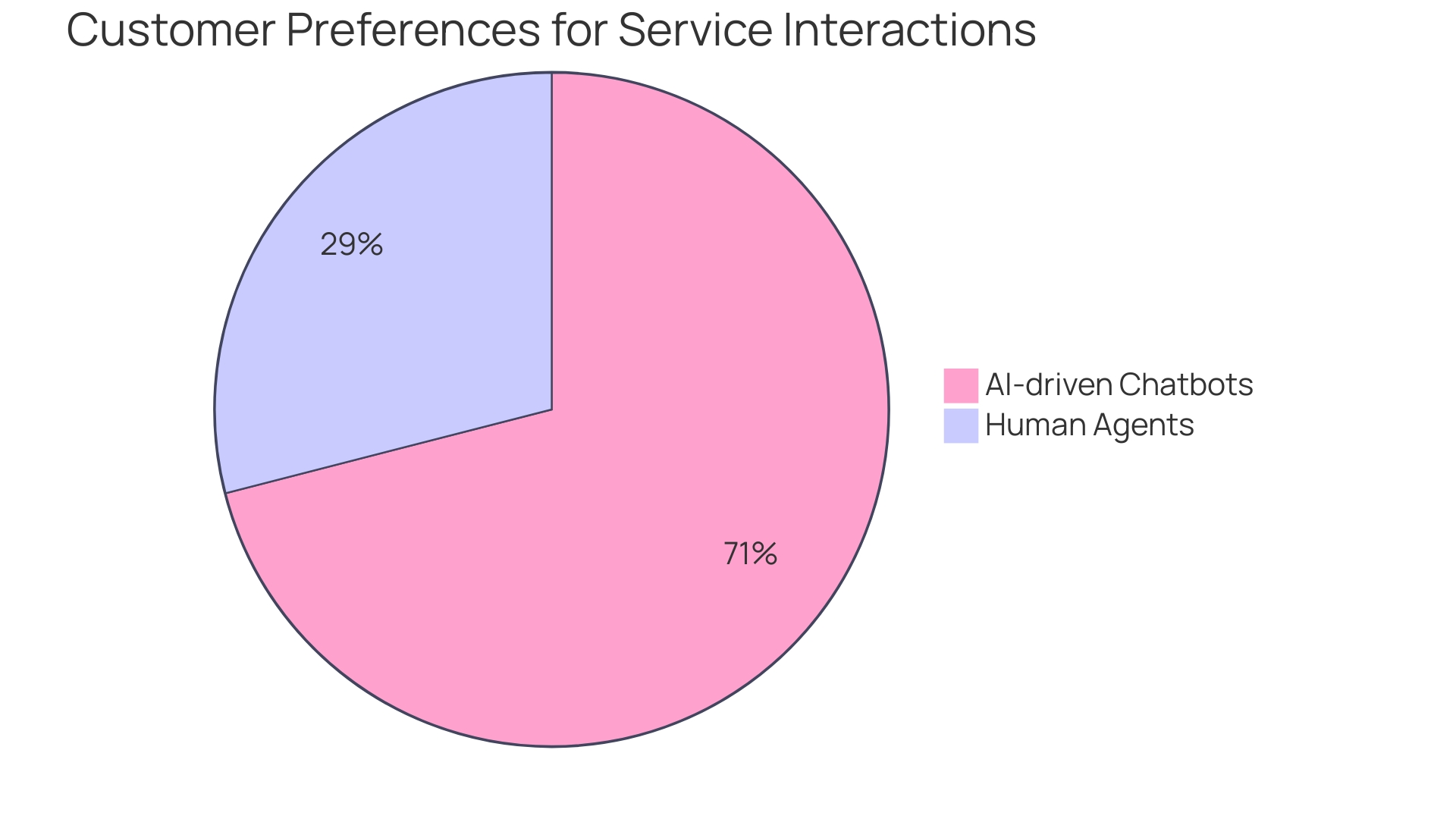Introduction
The integration of AI into customer engagement strategies has been transformative across various industries, as evidenced by successful case studies in biopharmaceuticals and the travel industry. This article explores the power of conversational AI in enhancing customer experiences and streamlining internal processes. It also highlights the best practices for implementing AI in customer service and marketing, emphasizing the importance of personalization, transparency, and ethical deployment.
Additionally, the challenges and lessons learned in AI implementation are discussed, emphasizing the need for high-quality data, ethical considerations, and adaptability. Lastly, the article delves into the healthcare applications of AI, showcasing case studies that demonstrate its impact on patient care, diagnosis, and resource allocation. Overall, this article provides insights into how AI is revolutionizing various industries and offers recommendations for successful integration.
TripAdvisor Case Study: Conversational AI for Engagement
The integration of AI into customer engagement strategies has been transformative across various industries, as evidenced by a biopharmaceutical giant who successfully upgraded their internal communication tools. By leveraging advanced technology, they developed a chatbot system that allowed support agents to instantly consult with experienced colleagues, thereby reducing wait times and enhancing the quality of customer service.
This AI-powered system maintained all the functionality of the previous tool while incorporating new, flexible features, demonstrating how AI can streamline internal processes and improve response times in critical situations. In the competitive travel industry, companies like Holiday Extras have harnessed the power of conversational AI to manage the complexities of serving an international clientele.
They've utilized ChatGPT Enterprise to facilitate innovation among employees, tackling challenges such as creating marketing copy in multiple languages and managing large-scale customer support. Their approach illustrates the potential of AI to boost efficiency and maintain a leading edge in a dynamic market.
Statistics show a clear customer preference for AI-driven interactions, with 71% favoring chatbots over human agents for quicker service. This shift towards AI solutions is reflected in the projected growth of the chatbot market, expected to reach nearly $5 billion by 2032. Companies embracing this technology, like Tidio with their chatbot Lyro, can automate a significant portion of customer requests, ensuring swift and effective problem resolution. The movement toward digital customer engagement is further emphasized by the expectation that, by 2024, 80% of consumers will favor businesses that offer integrated communication across various channels. This trend underscores the importance of AI in creating seamless, responsive, and personalized experiences for customers in today's digital age.

Best Practices for AI in Customer Experience
To successfully integrate AI in enhancing customer experiences, it's essential to tailor the AI algorithms to individual preferences, thereby personalizing interactions and fostering customer satisfaction. For example, Holiday Extras, a leader in European travel extras, has harnessed AI to meet the diverse needs of the international clientele.
By implementing ChatGPT Enterprise, they've empowered employees to innovate and meet the linguistic demands of the market, demonstrating the importance of responsive AI systems in customer engagement. Transparency in how customer data is utilized is of paramount importance, as is the ethical deployment of AI.
Companies like Ally Financial have exemplified this by using AI to reduce manual tasks, thereby allowing customer service associates to focus on providing a more personal and engaging service. Regularly monitoring AI systems for biases or errors is also vital, as evidenced by high-profile AI missteps that have necessitated rollbacks by tech giants.
Indeed, adopting AI can lead to impressive gains in customer service efficiency and satisfaction. Predictive analysis through virtual assistants, enhanced by AI-driven transcription and translation, is set to improve sales and service quality. These advancements, supported by AI-powered coaching and sentiment analysis, will not only boost agent performance but also ensure that customer experiences are significantly enriched, as Alan Finlay notes. Ultimately, the deployment of AI in customer experience strategies promises to yield substantial business metrics improvements and customer satisfaction.
Use Cases for AI in Marketing: Short Form Content and Beyond
The implementation of AI in marketing has been a game-changer for creating short-form content that resonates with customers. By leveraging natural language processing and machine learning, AI analyzes behavioral data to craft personalized messages with precision.
A notable example is an e-commerce leader who harnessed AI to dissect customer preferences, leading to content that not only engaged but also significantly boosted conversions and sales. This success story is a testament to AI's transformative power in marketing.
But the journey isn't without its hurdles. One e-commerce director sought to test AI's effectiveness in a niche where customers are skeptical of Ai's impersonal touch.
Overcoming this meant devising an SEO strategy that was both accessible and effective, aiming for results within a six-month window. Additionally, they grappled with domain issues and Google's sandboxing.
Moreover, these advancements are not going unnoticed. OpenAI's upcoming DevDay event in San Francisco is set to showcase new tools and foster idea exchange, signaling the rapid growth of AI tools in marketing.
The shift towards AI-generated content is backed by compelling data. A staggering 95.8% of marketers use AI daily across various departments, yet only 34% are fully satisfied with their AI implementations. Despite this, the prospect of improved customer engagement and satisfaction by 9% within three years due to generative AI is a compelling motivation for continued investment and refinement. In this landscape, the human touch remains vital. As one industry expert points out, AI can accelerate marketing strategy, but strategic decision-making still requires human intuition and expertise. Ai's role is to augment, not replace, the human element in marketing. As AI continues to evolve, marketers must balance data-driven insights with empathy and creativity to build authentic relationships with customers.
Challenges and Lessons Learned in AI Implementation
The integration of Artificial Intelligence (AI) into business operations is a transformative journey that demands thorough preparation and strategic oversight. To harness the full potential of AI, organizations must prioritize the acquisition and preparation of high-quality, diverse data sets.
This foundational step is crucial, as Ai's predictive accuracy and decision-making capabilities are directly influenced by the data it processes. Moreover, a successful AI implementation requires a vigilant approach to ethical and privacy considerations, ensuring that algorithms operate with transparency and fairness.
Companies like Wintershall Dea have embraced an AI@Scale approach, recognizing the need for AI solutions that are designed for scalability right from the outset. Kathrin Dufour, the company's Senior Vice President of Digitization and Technology, underscores the importance of a standardized environment that facilitates data access and collaboration within the partner ecosystem.
This approach is especially pertinent in today's climate, where data exchange is a frequent internal and external activity. However, the path to AI integration is not without its challenges.
The industry has observed significant setbacks when AI governance is not adequately addressed, with some companies experiencing losses ranging from $50M to $100M due to poorly managed AI deployments. Furthermore, the lack of diversity and inclusion solutions in AI presents a notable gap, with many challenges still lacking effective solutions. Front-line workers' engagement and the adaptability of AI pilots are also vital. Real-world insights suggest that customizing the workflow to meet their needs and building flexibility into early pilots can foster trust and ensure the technology aligns with the company's operational requirements. The AI landscape is evolving rapidly, and staying informed about the latest developments is essential. From the emergence of AI powerhouses to the continuous innovation in AI applications, organizations must navigate this dynamic field with a strategic and informed approach to reap the benefits of AI while mitigating its inherent risks.

Healthcare Applications: Case Studies from NEJM AI
The integration of AI into healthcare is revolutionizing patient care, with AI algorithms now capable of analyzing medical images to detect abnormalities, significantly aiding radiologists in diagnosis. The use of AI-powered virtual assistants is personalizing healthcare recommendations and improving medication adherence.
Deventer Hospital's pilot project exemplifies this transformation, utilizing AI to reduce radiologists' workloads and optimize emergency care through applications like BoneView, which automates the initial detection of bone fractures. Furthermore, the implementation of an AI system led by Lisa Shieh, MD, PhD, and her team at Stanford uses a prediction model to monitor patients' vital signs and other data to predict health deterioration, alerting the care team about potential declines in patient health.
This has been crucial in managing patient care more effectively. Atlantic Health's robust internal governance structure for monitoring AI applications ensures that AI is only implemented when it can genuinely solve problems, preventing the misuse of technology.
With companies like Anterior integrating clinical expertise in their AI teams, the healthcare industry is poised to see significant reductions in administrative costs and improvements in patient care, provided that accuracy, safety, and transparency are maintained. The AI algorithms have proven their impact across large health systems, improving resource allocation, patient outcomes, efficiency of care teams, and managing patient care costs, as demonstrated by Northwell Health, New York State's largest healthcare provider. As AI continues to develop, including advancements in large language models like GPT, its role in generating medical documentation and aiding in complex diagnoses is becoming increasingly clear. However, the adoption of AI in healthcare must be carefully managed, with improvements, validation, and ethical considerations addressed to ensure safe and effective clinical implementation.
Conclusion
In conclusion, the integration of AI into customer engagement strategies has transformed industries. Conversational AI enhances customer experiences and streamlines processes. Best practices emphasize personalization, transparency, and ethical deployment.
AI in customer service and marketing requires tailoring algorithms for personalized interactions. Transparency, ethical deployment, and bias monitoring are crucial. AI in marketing creates resonating short-form content, but challenges like SEO strategy must be overcome.
In healthcare, AI revolutionizes patient care through image analysis, personalized recommendations, and predictive monitoring. Challenges include accuracy, safety, validation, and ethics. Overall, AI revolutionizes industries by enhancing experiences and improving processes.
Successful integration requires high-quality data acquisition, ethics, adaptability, transparency, and customization. Staying informed is essential. With strategic oversight, businesses can harness AI's benefits while mitigating risks.





